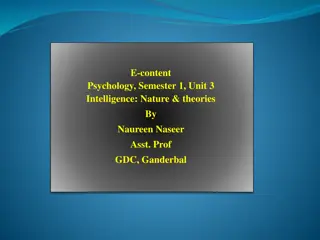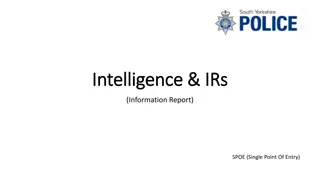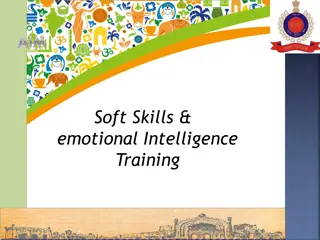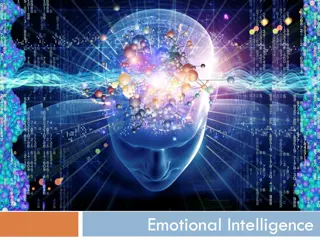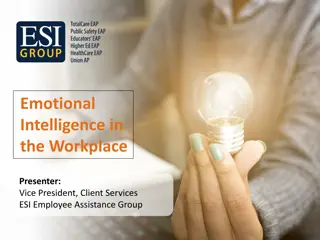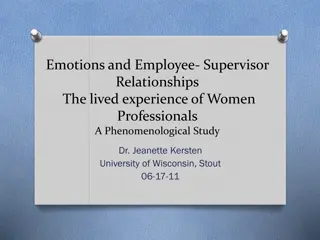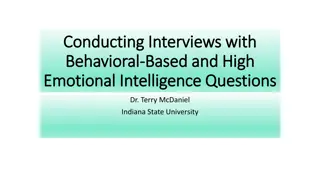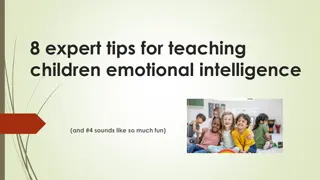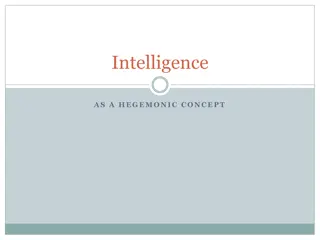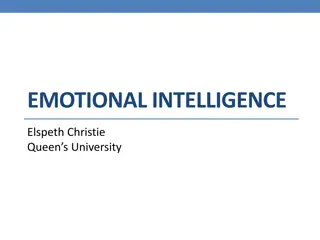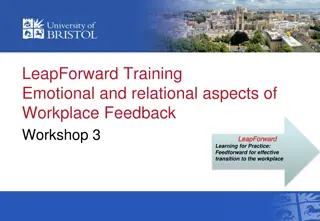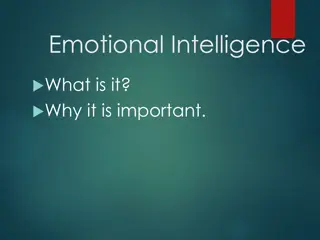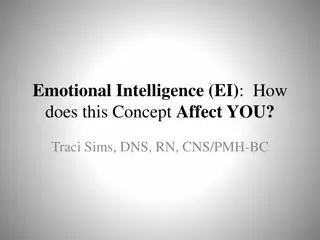Understanding Emotional Intelligence in the Workplace
Emotional intelligence plays a crucial role in professional success, impacting how we lead teams, handle pressure, and build relationships. This webinar explores the definition of emotional intelligence, its significance in the workplace, and practical ways to enhance it. Discover the key elements of emotional intelligence, how it influences behavior and communication styles, and its impact on team dynamics and individual performance.
- Emotional intelligence
- Workplace success
- Team dynamics
- Communication styles
- Professional development
Uploaded on Oct 07, 2024 | 0 Views
Download Presentation

Please find below an Image/Link to download the presentation.
The content on the website is provided AS IS for your information and personal use only. It may not be sold, licensed, or shared on other websites without obtaining consent from the author. Download presentation by click this link. If you encounter any issues during the download, it is possible that the publisher has removed the file from their server.
E N D
Presentation Transcript
Webinar Understanding and motivating your colleagues Russell Dalton D E V E L O P I N G E X C E L L E N C E T O G E T H E R
What is emotional intelligence and why does it matter? Learning objectives Understand the personal and professional benefits of emotional intelligence (or EQ). Increase awareness of personality types and how responding differently to different types can improve performance and relationships within a team. Become more self-aware as to your own preferred behaviours and styles and how that may influence others. Be better equipped to perform under pressure and get results from your colleagues and team. D E V E L O P I N G E X C E L L E N C E T O G E T H E R
What is emotional intelligence and why does it matter? The capacity for recognising our own feelings and those of others for motivating ourselves, and for managing emotions well in ourselves and in our relationships . Daniel Goleman D E V E L O P I N G E X C E L L E N C E T O G E T H E R
What is emotional intelligence and why does it matter? Out of 20,000+ employees over a 3 year period. Of those who fail: 26% fail because they can t learn from feedback 23% fail because they cannot understand and manage emotions 11% fail because they lack key technical skills Havard Business Review 2002 D E V E L O P I N G E X C E L L E N C E T O G E T H E R
What is emotional intelligence and why does it matter? Emotional awareness Self-confidence Accurate self-assessment Self - awareness Personal Self-control Trustworthiness Conscientiousness Adaptability Innovation Achievement drive Commitment Initiative Optimism Self - Motivation regulation Emotional Intelligence Influence Communication Conflict management Leadership Change catalyst Building bonds Collaboration and cooperation Team capabilities Understanding others Developing others Service orientation Leveraging diversity Political awareness Social skills Empathy Social D E V E L O P I N G E X C E L L E N C E T O G E T H E R
Behavioural styles Analytical This behavioural style is noted for the ability to gather and review data. This style is typical of people in technical positions such as engineering, accounting and IT. Details and accuracy are important to these people, and they take great pride in providing information that is correct. Amiable Amiables are highly supportive individuals interested in establishing and maintaining relationships in an organisation. This behavioural style is typical of employees in human resources and social or medical services. Driver Drivers, as the name implies, are often the driving force behind getting things done in an organisation. They are results-oriented individuals who are motivated by goals. Drivers typically gravitate to positions in management. Expressive Expressives are visionaries, good at grasping the big picture. Expressives typically gravitate to positions in marketing and strive to get ahead in an organisation. They are truly the politicians in an organisation, establishing and using contacts extensively. D E V E L O P I N G E X C E L L E N C E T O G E T H E R
Where is your energy naturally directed? Extraverts often: Introverts often: have high energy talk more than listen think out loud act, then think like to be around people a lot prefer a public role can sometimes be easily distracted prefer to do lots of things at once are outgoing & enthusiastic. have quiet energy listen more than talk think quietly inside their heads think, then act feel comfortable being alone prefer to work "behind-the-scenes" have good powers of concentration prefer to focus on one thing at a time are self-contained and reserved. D E V E L O P I N G E X C E L L E N C E T O G E T H E R
What kind of information do you naturally notice and remember? Sensors often: Intuitives often: focus on details & specifics admire practical solutions notice details & remember facts are pragmatic - see what is live in the here-and-now trust actual experience like to use established skills like step-by-step instructions work at a steady pace. Focus on the big picture & possibilities admire creative ideas notice anything new or different are inventive - see what could be think about future implications trust their gut instincts prefer to learn new skills like to figure things out for themselves work in bursts of energy. D E V E L O P I N G E X C E L L E N C E T O G E T H E R
How do you decide or come to conclusions? Thinkers often: Feelers often: make decisions objectively appear cool and reserved are most convinced by rational arguments are honest and direct value honesty and fairness take few things personally are good at seeing flaws are motivated by achievement argue or debate issues for fun. decide based on their values & feelings appear warm and friendly are most convinced by how they feel are diplomatic and tactful value harmony and compassion take many things personally are quick to compliment others are motivated by appreciation avoid arguments and conflicts. D E V E L O P I N G E X C E L L E N C E T O G E T H E R
What kind of environment makes you the most comfortable? Judgers often: Perceivers often: like to have things settled take responsibilities seriously pay attention to time & are usually prompt prefer to finish projects work first, play later seek closure see the need for most rules like to make & stick with plans find comfort in schedules. like to keep their options open are playful and casual are less aware of time and may run late prefer to start projects play first, work later may have difficulty making some decisions question the need for many rules like to keep plans flexible want the freedom to be spontaneous. D E V E L O P I N G E X C E L L E N C E T O G E T H E R
In summary Working on your emotional intelligence could well be the most important aspect of your personal development. Research has shown that people with higher levels of emotional intelligence enjoy more satisfying and successful careers and relationships. If you think about ways to enhance your EI, you are likely to become more interesting and attractive to others, and you will also give your self-esteem a boost. D E V E L O P I N G E X C E L L E N C E T O G E T H E R
Questions & Answers Find more resources at: http://my.optimus-education.com/knowledge-centre/school-business-management Follow us on Twitter: @BusinessOE D E V E L O P I N G E X C E L L E N C E T O G E T H E R


